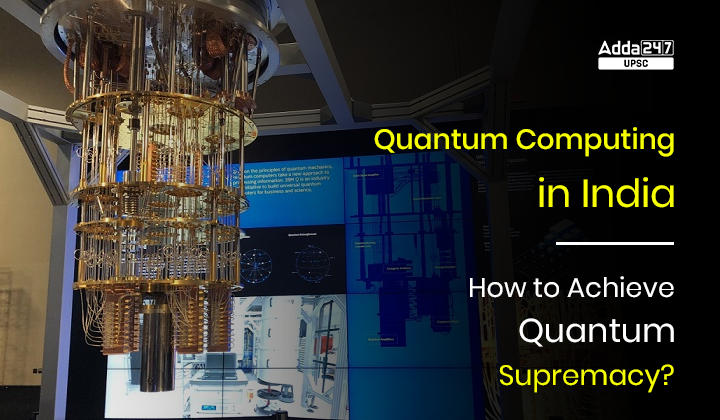Table of Contents
Why we are reading this article – ‘Quantum Computing in India’
- It is very important for India to not lag behind other countries in achieving Quantum Supremacy in India.
- As, Quantum Computers (QC) has ability to take advantage of quantum physics to solve problems too complex for conventional computers.
- Several institutes and companies worldwide have invested in developing QC systems, from software to solve specific problems to the science that goes into expanding their hardware capabilities.
- This topic ‘Quantum Computing in India’ covers GS Paper 3: IT & Computers.
Background of Quantum Computing in India
In 2021, the Indian government launched a mission to study quantum technologies with an allocation of ₹8,000 crore; the army opened a quantum research facility in Madhya Pradesh; and the Department of Science and Technology co-launched another facility in Pune.
What is Quantum Mechanics?
- Quantum mechanics is a subfield of physics that describes the behavior of particles — atoms, electrons, photons and almost everything in the molecular and submolecular realm.
- Developed during the first half of the 20th century, the results of quantum mechanics are often extremely strange and counterintuitive.
- In classical mechanics, objects exist in a specific place at a specific time. In quantum mechanics, objects instead exist in a haze of probability; they have a certain chance of being at point A, another chance of being at point B and so on.
- Quantum physics describes reality at the subatomic scale, where the objects are particles like electrons.
- Here, we can’t pinpoint the location of an electron. We can only know that it will be present in some volume of space, with a probability attached to each point in the volume: say, 10% at point A and 5% at point B.
Indo-Finnish Virtual Network Centre on Quantum Computing
What is Quantum Computer?
- The computers found in most of our homes and workplaces process data in bits, which have a binary value of either zero or one.
- Quantum computers instead use a two-state unit for data processing called a qubit.
- This can represent digits like one or zero simultaneously through a quantum mechanical process called superposition, letting quantum computers bridge binary digits and cope with uncertainty where regular computers cannot.
- Quantum computing experts and physicists say this means that the problems combed over by average computers for years could be solved in a matter of minutes.
- So, the promise of quantum computing is that it will help to solve problems that standard computers can’t handle.
- Companies around the world are racing to create a new generation of computers that could revolutionise complex tasks such as developing new drugs and medicines.
What is qubit?
- Qubit is the fundamental unit of a QC. It could be a particle like an electron. Some information is directly encoded on the qubit
- The qubits are entangled to ensure they work together. If one qubit is probed to reveal its state, the states of all entangled qubits will be revealed as well. The computer’s final output is the state to which all the qubits have collapsed.
- One qubit can encode two states, so a computer with N qubits can encode 2N states. A computer with N transistors can only encode 2N states. So a qubit-based computer can access more states than a transistor-based computer, and thus access more computational pathways and, solutions to more complex problems.
What is Quantum Supremacy?
- Quantum supremacy refers to a quantum computer solving a problem that cannot be expected of a classical computer in a normal lifetime.
- This relates to the speed at which a quantum computer performs.
- In October 2019, a Sycamore processor (a Google quantum processor) created in conjunction with Google AI Quantum was reported to have achieved quantum supremacy, with calculations more than 3,000,000 times as fast as those of Summit, an IBM supercomputer that is currently one of the fastest supercomputers in the world.
- By December 2020, even Chinese universities were reportedly having success in quantum computing.
Where India is heading on Quantum Computing?
- There are no quantum computers in India yet.
- In 2018, the Department of Science & Technology unveiled a programme called Quantum-Enabled Science & Technology (QuEST) and committed to investing ₹80 crore over the next three years to accelerate research.
- In 2021, the Indian government launched National Mission on Quantum Technologies & Applications (NM-QTA) to study quantum technologies with an allocation of ₹8,000 crore
- The plan is to have a quantum computer built in India within the next decade.
- Which are the Key Challenges?
- The quantum ecosystem in India is loosely built.
- Phase-1 of the problem involves hiring research experts and establishing teams with the know-how to physically build such systems.
- Metrics to assess the outcomes of India’s quantum efforts are not clearly defined.
- A common platform for all quantum research and development in the country is lacking.
- How to Achieve Quantum Supremacy in India?
- To achieve supremacy in quantum computing and other technologies, India must develop the required institutional structures.
- For developing a quantum computer at home, India will need superconducting materials, physical qubits, a data plane, chips, processors, and fabrication labs.
- For India to move from being an importer of quantum technology to an exporter, it needs to revisit and rework its technology policy objectives, frameworks, and deliverables.
- Considering potential risks of the technology, India needs to ramp up its efforts to match pace the US and China, both of which have achieved quantum supremacy.
Also Read:
Recent Science and Technology Current Affairs Articles:



 TSPSC Group 1 Question Paper 2024, Downl...
TSPSC Group 1 Question Paper 2024, Downl...
 TSPSC Group 1 Answer key 2024 Out, Downl...
TSPSC Group 1 Answer key 2024 Out, Downl...
 UPSC Prelims 2024 Question Paper, Downlo...
UPSC Prelims 2024 Question Paper, Downlo...
